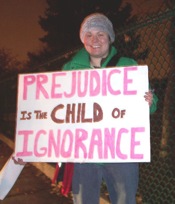 Surprisingly little psychological research has been conducted with atheists. I know this because I've looked into it. Only a handful of empirical studies have been published; however, I am optimistic that this will soon begin to change. There are too many of us to ignore for long, and there is much to gain from studying atheists and how we are perceived by others.
Surprisingly little psychological research has been conducted with atheists. I know this because I've looked into it. Only a handful of empirical studies have been published; however, I am optimistic that this will soon begin to change. There are too many of us to ignore for long, and there is much to gain from studying atheists and how we are perceived by others.Gervais (2011) published a fascinating article in Personality and Social Psychology Bulletin in which he addresses one important factor for reducing anti-atheist prejudice. I should mention that this is a reputable peer-reviewed journal in the social psychology area.
Here's the abstract:
Although prejudice is typically positively related to relative outgroup size, four studies found converging evidence that perceived atheist prevalence reduces anti-atheist prejudice. Study 1 demonstrated that anti-atheist prejudice among religious believers is reduced in countries in which atheists are especially prevalent. Study 2 demonstrated that perceived atheist prevalence is negatively associated with anti-atheist prejudice. Study 3 demonstrated a causal relationship: Reminders of atheist prevalence reduced explicit distrust of atheists. These results appeared distinct from intergroup contact effects. Study 4 demonstrated that prevalence information decreased implicit atheist distrust. The latter two experiments provide the first evidence that mere prevalence information can reduce prejudice against any outgroup. These findings offer insights about anti-atheist prejudice, a poorly understood phenomenon. Furthermore, they suggest both novel directions for future prejudice research and potential interventions that could reduce a variety of prejudices.Thus, the take-home message is that one's perception of how many atheists there are is related to one's attitudes toward atheists. Moreover, Gervais found evidence that messages designed to inform people about the prevalence of atheists reduced the degree to which people distrust us. This is an important finding for understanding prejudice in general and prejudice against atheists in particular.
For those of us interested in reducing anti-atheist bigotry, it appears that one of our strategies should involve obtaining accurate estimates of our numbers and then informing people of this information. Of course, atheists have been arguing for some time that the more of us are open about our atheism, the harder it will be for the religious to maintain their prejudice. I suspect this is because the key factor is one's perception of how many of us there are. Fortunately, there is much we can do to affect such perceptions.
H/T to The Secular Outpost